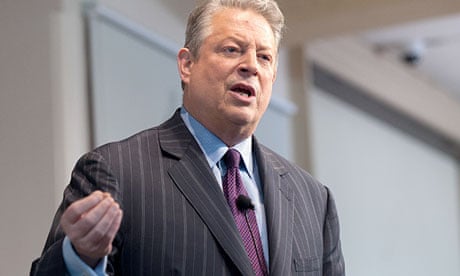US democracy has been "hacked" by big business and needs to be reclaimed using the power of the internet to hold politicians to account, according to former US vice-president Al Gore.
Offering a blunt assessment of the extent to which private companies influence decision-making in the US, he told the BBC's Andrew Marr Show: "American politics has fallen into a state of disrepair," in an interview to mark the publication of his new book, The Future.
Gore added: "It can be fixed, but we need to recognise that our democracy has been hacked … It has been taken over … and is being operated for purposes other than those for which it was intended."
In the interview, Gore alluded to a 2010 US supreme court decision that banned restrictions on political donations by corporations in the name of free speech.
He agreed that US politics hasd become more divisive, saying: "Certainly the level of partisanship and vitriol has been growing. And I think it is directly connected to the influence of big money – anonymous contributors, corporations pretending to be people and pursuing their business plans in the guise of politics and encouraging many politicians to say things and do things that would not have been seen in the best interests of the public in years past."
Gore said his own political ambitions had switched from trying to gain elected office to influencing events from the outside.
He said: "I think you can change [politics] from the outside as well. I think a grassroots movement to demand that politics be opened up, and the role of money be diminished, is really more needed now than anything else."
Gore said the internet and the revolution in the way we communicate provided a means to rekindle democracy and purge it of corporate influence. His new book identifies global electronic communications as one of six drivers of change.
He told the BBC it had the potential to be a force for good. "For a variety of reasons democracy has not flourished in the age of television, but the internet changes that, and once again empowers individuals to take part in a robust give-and-take that gives rise to a greater appreciation for the role of reason and facts and logic," he said.
Gore added: "We see individual bloggers having an impact on policy debates. We see fact-checking taking place on the internet that actually does change the way issues are dealt with. Television is still the dominant medium, but particularly with young people the internet is growing by leaps and bounds and I think soon will justify the optimism that individuals empowered by this new communications infrastructure will be able to reclaim their birthrights as free citizens and redeem the promise of representative democracy."
Gore's 2006 hit film and book, An Inconvenient Truth, did much to raise awareness of the dangers of climate change.
On the Marr show, stand-in presenter Sian Williams asked Gore to defend the sale last month of his Current TV channel to al-Jazeera – the satellite TV network partly owned by Qatar, a country with the largest per capita carbon footprint in the world.
Gore said that unlike US news networks, al-Jazeera does not carry extensive advertisements from oil companies. "Its climate coverage has been outstanding, and I hope that other networks will be encouraged by the addition of al-Jazeera to the television dial to upgrade their own climate reporting," Gore said.
